UPDATE 12/1/16: Lisa’s brand new book The Tea Girl of Hummingbird Lane is expected to be published 3/21/17. Looking forward to this!
UPDATE 4/4/14: Lisa’s newest book, China Dolls, is coming out June 3 and getting a lot of attention from her fans. It’s set in San Francisco before World War II and promises to be another bestseller.
By Pamela Burke
TWITTER: @Lisa_See
Best-selling novelist Lisa See has been fascinated with Chinese culture and female friendship ever since she published her first book “On Gold Mountain” in 1995. This “Los Angeles treasure,” as she’s been called, is now the author of seven popular novels with the release this year of “Dreams of Joy.”
“…write 1,000 words a day and one charming note. I now say that to anyone who will listen.” Lisa See
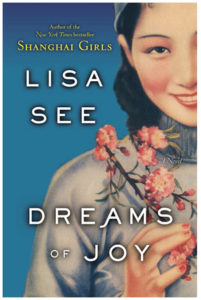 When “Snow Flower and the Secret Fan,” a master work that has been translated into 38 languages, made its way to the silver screen, our reviewer Sue Podbielski praised its seldom portrayed theme of women’s loyalty and friendship.
When “Snow Flower and the Secret Fan,” a master work that has been translated into 38 languages, made its way to the silver screen, our reviewer Sue Podbielski praised its seldom portrayed theme of women’s loyalty and friendship.
We were delighted when we could talk to Lisa on “The Women’s Eye Radio Show” and hear more about how she “cuts to the bone” when she writes. She’s working on yet another novel, but she took time out to talk to us about the love she has for her craft. Here is Stacey Gualandi’s interview…
EYE: You live in L.A. but you write so wonderfully about China and Chinese culture. Why is that?
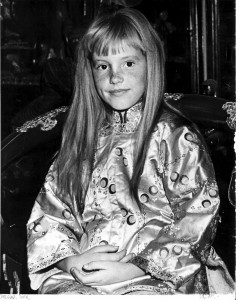
LISA: I grew up in a very traditional Chinese-American family. In fact, my great-grandfather was the godfather-patriarch of Chinatown in Los Angeles so I have that connection both to Los Angeles and certainly L.A. Chinatown and by extension to China and Chinese culture.
Your listeners and readers can’t see me, but I have red hair and freckles.
EYE: So do I. I’m Italian, but I look Irish.
LISA: I look very Irish. But that said, in Los Angeles I have about 400 relatives. A dozen that look like me. The majority are full Chinese, then there is this spectrum in between.
You identify yourself by the people you see around you. And when I was growing up, I saw Chinese faces for a good part of the time.
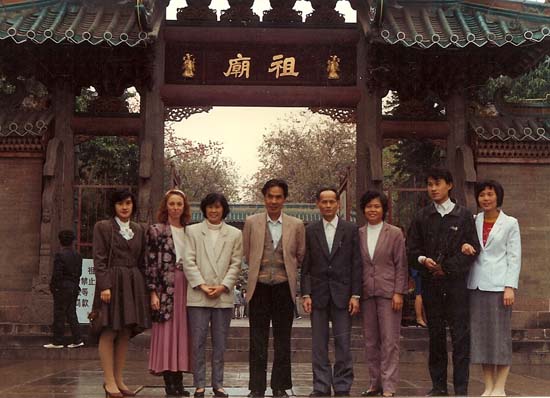
EYE: How much do you think your ancestry has shaped who you are today?
LISA: One hundred percent. The things I write about come from my father’s side of the family. My father is an anthropologist, but my mother is a writer. I think that combination leads to someone who might end up writing historical novels.
“It’s really from my mother that I found the courage and persistence to write the kinds of books that I do.”
EYE: Your mother, Carolyn See, is a writer yet you didn’t decide to become one until college. Did she influence you?
LISA: I thought I didn’t want to become a writer. My mom is the godmother of women writing in southern California. She was doing it when no one else was. She broke through so many barriers for women. At the time, way back in the sixties, it was very hard.
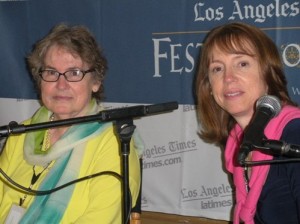
I can remember she’d be on the phone with an editor who was so cruel. She’d go in the bathroom and cry, but she was very tough and persistent. At the time I thought I really don’t want that.
EYE: Did she give you a lot of advice about writing?
LISA: Absolutely. I was doing some research about her at the UCLA Special Collections, and I came across a letter written to her from her father. He was a writer and a newspaperman, and he had wrote that you need to write 1,000 words a day and one charming note.
The whole time that I was growing up I always heard her say write 1,000 words a day and one charming note. I now say that to anyone who will listen. I do feel like I have had a lifelong apprenticeship.
I’ve never taken any writing courses, but I lived with a writer, and my grandfather was a writer. I think it’s good thing they weren’t plumbers as I probably would have ended up one.
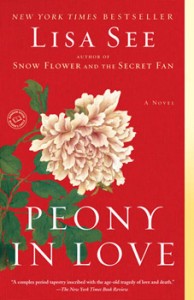 EYE: You’ve always said you write what you know. You make it seem very easy to write, but when you write one of your novels, especially “Dreams of Joy” which just came out, is it still fun? Is it really easy?
EYE: You’ve always said you write what you know. You make it seem very easy to write, but when you write one of your novels, especially “Dreams of Joy” which just came out, is it still fun? Is it really easy?
LISA: It does have that combination of great joy and great horror. When it’s going well, it’s the best thing in the world. When it isn’t, it’s just torture. For me of course I love to write. In fact I just started a new book a few days ago; I’m only twelve pages in.
But I’ve already been doing research for six months. I love the research. Even when I’m writing about something I don’t know, I’ve spent so much time doing research that by the time I sit down to write, I actually do know what I’m writing about.
I’ve also been very drawn to something these women writers in 17th century China believed. Their belief or mantra was that you need to cut to the bone to write.
“I really felt I had to cut to the bone to get to those places emotionally…”
EYE: What does that mean?
LISA: You have to go deep, and it’s not going to be easy. It’s going to be painful at times. The first half of “Dreams of Joy” is about finding Joy, the daughter who had run away. The second half is about finding joy, the emotion. It has joy in the title.
Yet there are some very painful and sad parts of the book. I really felt I had to cut to the bone to get to those places emotionally for me to write the truth of those relationships, the truth of those emotions and the realities of the historic situation those people were in.
EYE: So much of that is historically looking back at the bond between these females and those friendships. Is that laotong?
LISA: Laotong means “old sames.” That was a kind of relationship that was found in one county in southwestern Hunan province. It sort of means best friends for life, but it was very formalized and almost like an emotional marriage.
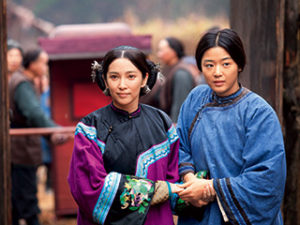
EYE: That’s why people are so fascinated with your books. The research is there. They are based on actual history. With “Snow Flower and the Secret Fan,” you were actually the second foreigner to go deep into the part of China where this language existed for thousands of years, the nu shu language.
LISA: This was a secret writing language that these illiterate women had invented, used and kept secret. When I went there, I was told I was the second Caucasian-looking foreigner to go there. That was a very hard trip.
I’m not a camper; this was way out there. There was no hot water and limited electricity. I had a choice at my hotel. They could either lock me in at night, or I had to sleep with the door open.
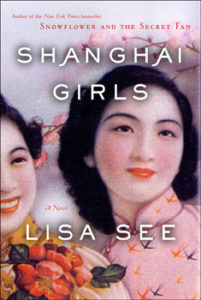 EYE: All of this experience seems to fuel your writing. Also, book clubs have been an instrumental part of your success. You sought them out to get your books out there. Why are they important?
EYE: All of this experience seems to fuel your writing. Also, book clubs have been an instrumental part of your success. You sought them out to get your books out there. Why are they important?
LISA: They are a great way for women especially to gather and have an excuse to gather. Women are so busy. If they say to their husbands and boyfriends that they are going out to drink margaritas the first Tuesday of every month, their men wouldn’t be so excited to hear that.
But if they say we’re going to get together and read a book and talk about it, there’s more acceptance. It’s not so frivolous or threatening.
When you read a book, you’re opening those pages, stepping into another world, time, culture, and a slice of life you don’t know. You connect to those characters whether real or imagined. And you’re thinking about your life and what you would have done. You’re also connecting in a larger way to the human condition.
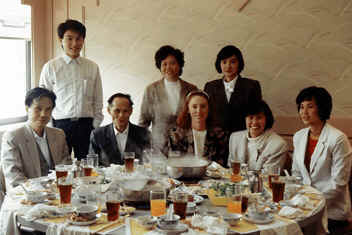
You can do that in a book club in a communal way. You’re hearing from someone else how they felt or what they would have done. I join a lot of book clubs by speaker phone, and I know that people will talk about their own relationships and lives in the course of talking about that month’s novel.
EYE: Your stories are springboards…
LISA: Not just mine but it happens in a lot of book clubs. It’s an excuse to get together, and then it gives us a way to talk about what’s going on in our lives but through the medium of a novel.
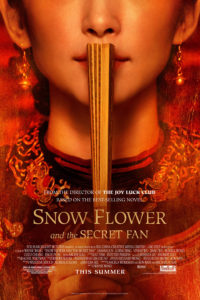
EYE: Your fans are very passionate. But when one of your books is being made into a major motion picture, some of them say stick to the books. One of our own reviewers, Sue Podbielski, had a little bit of trouble with that movie changing your book.
LISA: Not a little but a lot. The part that’s based on the book is very true to it. They hired experts to teach actresses how to write nu shu, how to sing nu shu and how to do foot bindings. But they did add a modern story of friendship that takes place in Shanghai today.
I told them what I thought worked and what didn’t, and they didn’t listen to me. People have asked me, “How could you let them do that to your book?” There’s very little control for a writer. But that’s not even the point. The point is they haven’t done anything to the book. It’s still on the shelf. It’s completely untouched.
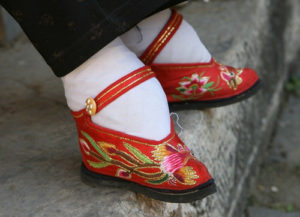 EYE: Your movie delves into foot binding which many people aren’t aware of. What do you think about the food binding aspect of your ancestry?
EYE: Your movie delves into foot binding which many people aren’t aware of. What do you think about the food binding aspect of your ancestry?
LISA: Foot binding happened when women wrapped their daughters feet, breaking their bones. The goal was for the toes of the foot to come back to meet the heel of the foot so that all that a little girl and later as a woman could walk on was her big toe.
EYE: Do you think that this relates to our lives at all today in any way?
LISA: The obvious thing is breast implants. The number one age for breast implants in the U. S is 17. Some mothers say the reason they give that to their daughters is that they want their clothes to fit better. Or they want her to have better self-esteem. But the core reason is that they want to make her more marriageable.
That’s not any different than the reason why mothers bound their daughters feet in China. If you could give your daughter a pair of perfectly bound feet, then she would marry into a better family and have a better life.
There is something else though. This may be what people think about. It’s rare for women to go out these days. There is so little spare time. We’re very bound up by our lives today; we’re bound up by work and responsibility.
We have this longing to break out of that binding, whether it’s on our feet or in our hearts and find someone who will listen to us and with whom we can share our lives.
“I am interested in stories that have been lost and forgotten, especially in how they relate to women.”
EYE: Do you still feel that you want to seek out these kinds of hidden stories in China?
LISA: There are so many stories and so much history about women we don’t even know. There is that sense that in the past there were no women writers, artists or architects, etc. There were women but supposedly they didn’t do anything. However there is evidence that they did do awesome things, but it was lost or covered up.
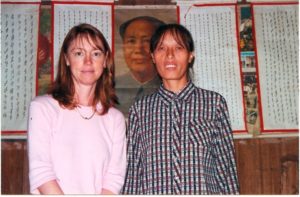
That is what is driving me, that sense of trying to find these women’s stories. In “Dreams of Joy,” I’ve written about the Great Leap Forward and how women went through that. That story hasn’t been told.
In “Shanghai Girls,” two sisters come to the U.S. and have to pass through Angel Island, a kind of an Ellis Island of the west coast. A lot has been written about the men’s experience there but almost nothing about what it was like for women, and it was a very different experience.
We’re here today and are enjoying the benefits of our lives today on the backs of all these women who came before us. I really feel a kind of responsibility to them and also a great sense of gratitude.
EYE: You have certainly done them proud. Are you still having fun writing? You just started a new book so you must be enjoying it or what’s the point?
LISA: I love it. As I said earlier, when it’s going well, there’s nothing like it. It’s the best feeling. I’ll get done with my thousand words, and it’s almost like a runner’s high. You feel some kind of physical thing that I just love.
EYE: Good luck to you and your mother, Lisa. We can’t wait for your next book to come out!
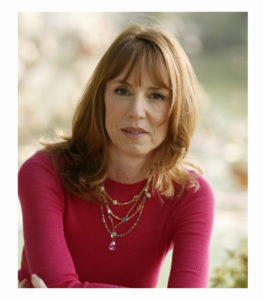




Leave a Reply